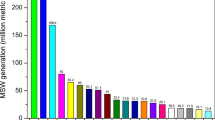Abstract
Methods of processing and disposal of municipal solid waste abroad and in our country are compared. A significant technological lag by Russia in this area is noted. Known technologies of waste disposal by incineration, high-temperature decomposition, biodegradation, and landfill burial are analyzed. The physical foundations, advantages, and disadvantages of incineration and degradation are considered. The unreasonableness of choosing waste incineration on a grate as the main technology for its neutralization and elimination, adopted in Russia, is noted. The volume of not only generated but also previously formed unsorted waste (“accumulated damage”) is analyzed. It is concluded that, for our country, the priority waste disposal technology should be biodegradation using a system of drainage and disposal of waste gases and contaminated infiltration solutions.




Similar content being viewed by others
REFERENCES
I. M. Mazurin, V. V. Ponurovskaya, and S. P. Kolotukhin, “System analysis of solid household waste processing,” Vestn. Ross. Akad. Estestv. Nauk 18 (5), 76–84 (2018).
State Report “On the State and Protection of the Environment of the Russian Federation in 2018” (Minprirody Rossii; NPP Kodast, Moscow, 2019) [in Russian].
Ecology national project passport. http://docs.cntd.ru/document/552233231.
Z. Pluzhnikova and N. Ivannikova, Dioxins: Will Russia become a second Vietnam? IA REGNUM, Nov. 12 (2018). https://regnum.ru/news/polit/2517741.html.
I. Mazurin, V. Ponurovskaya, and S. Kolotukhin, On the fundamental unsuitability of waste incineration technologies for Russia. https://regnum.ru/news/innovatio/2512284.html.
P. Elliott, N. Eaton, G. Shaddick, and R. Carter, “Can incidence near municipal solid waste incinerators in Great Britain. Part 2: Histopathological and case-note review of primary liver cancer cases,” Br. J. Cancer 85 (5), 1103–1106 (2000).
J. Garsia-Pereza, P. Fernandez-Navarroa, A. Castelloa, et al., “Cancer mortality in towns in the vicinity of incinerators and installations for the recovery or disposal of hazardous waste,” Environ. Int. 51, 31–44 (2013).
V. S. Rybal’chenko and I. V. Rybal’chenko, “Transferring the discussion about the ways of waste disposal from the plane of business decisions to the sphere of scientific discussion as the most important state task,” Ekol. Vestn. Ross., No. 8, 28–33 (2019).
I. V. Zharkov, Introduce the energy of the future or stay in the past: 2020. https://ekogradmoscow.ru/vshody/eko-energetika/vnedryat-energetiku-budushchego-ili-ostatsya-v-proshlom.
I. M. Mazurin and V. V. Ponurovskaya, Waste incineration incompatible with the concept of sustainable development. https://regnum.ru/news/innovatio/2240524.html.
“Agreement No. 118 dated July 6, 2017, between the Government of Moscow oblast and AGK-1 LLC,” Argumenty Nedeli, Sep. 14 (2017).
Swiss technologies mutated near Moscow. https://odintsovo.info/news/?id=66887.
V. V. Sosnovtsev, The best incinerators out of reach for Russia. https://regnum.ru/news/polit/2453732.html.
A. Arkenbout, Hidden emissions: A story from the Netherlands: Case Study. https://zerowasteeurope.eu/library/hidden-emissions-a-story-from-the-netherlands.
V. V. Aleksashina, “Ecology of the city: Waste incineration plants,” Academia. Arkhitektura Stroitel’stvo, No. 4, 77–86 (2014).
V. S. Rybal’chenko and I. V. Rybal’chenko, “Russian technologies for waste processing: Why does the country—the absolute leader in terms of scientific achievements in waste disposal—buy technology abroad?,” Ekol. Vestn. Ross., No. 12, 40–49 (2019).
L. I. Leont’ev, “Prospects for the disposal of solid municipal waste in the Russian Federation,” in Proceedings of the Congress with International Participation and the Conference of Young Scientists “Fundamental Research and Applied Development of the Processing and Disposal of Anthropogenic Formations” Technogen-2019 (IMET UrO RAN, Ekaterinburg, 2019), pp. 18–25 [in Russian].
SNiP 2.01.28-85. Toxic Industrial Waste Decontamination and Burial Sites—Basic Design Principles (Gosstroi SSSR, Moscow, 1985). http://docs.cntd.ru/document/556794132.
V. I. Osipov, Yu. A. Mamaev, and I. V. Kozlyakova, “Territorial placement of solid municipal waste landfills,” Herald Russ. Acad. Sci. 90 (6), 338–344 (2020).
I. V. Kozlyakova, I. A. Kozhevnikova, N. G. Anisimova, and P. V. Ivanov, “Engineering and geological zoning of the Central Federal District of Russia by the conditions for locating enterprises and landfills for solid household waste disposal,” in Sergeev Readings (RUDN, Moscow, 2018), No. 20, 74–78 [in Russian].
V. I. Osipov, “Solid municipal waste management as a federal environmental project,” Geoekologiya, No. 3, 3–11 (2019).
Author information
Authors and Affiliations
Corresponding author
Additional information
Translated by B. Alekseev
RAS Academician Viktor Ivanovich Osipov is Scientific Advisor of the RAS Institute of Environmental Geoscience (IEG RAS).
Rights and permissions
About this article
Cite this article
Osipov, V.I. Is It Better To Incinerate Municipal Solid Waste or Degrade It?. Her. Russ. Acad. Sci. 91, 492–500 (2021). https://doi.org/10.1134/S1019331621040146
Received:
Revised:
Accepted:
Published:
Issue Date:
DOI: https://doi.org/10.1134/S1019331621040146




